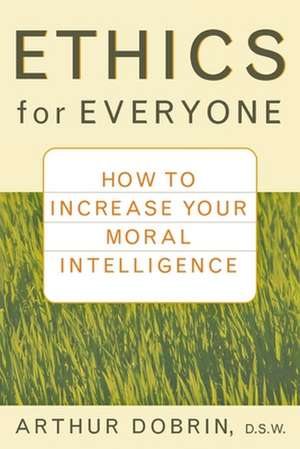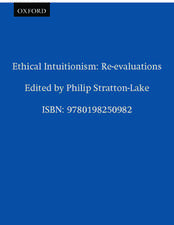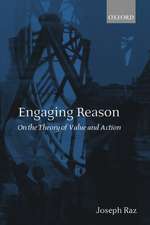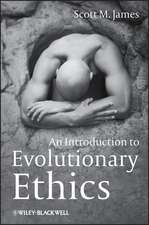Ethics for Everyone: How to Increase Your Moral Intelligence
Autor Arthur Dobrinen Limba Engleză Paperback – 11 apr 2002
Is it always wrong to lie? Is it always right to try to help another person? Are you bound to keep every promise you make? In Ethics for Everyone: How to Increase Your Moral Intelligence, you′ll find out how well you make moral choices and learn how to increase your ability to understand and analyze ethical dilemmas. This sensible, practical guide provides thoughtful–and sometimes surprising–answers to tough real–world questions. You′ll sort through dozens of tricky ethical issues with the help of:
∗ Twenty–one dramatic true stories showing real–life ethics in action– and you are asked to make ethical choices
∗ A personal ethics quiz to determine your own ethical potential
∗ Harm and benefits assessments of various courses of action
∗ Expert opinions from spiritual leaders, counselors, attorneys, psychologists, and other experts
| Toate formatele și edițiile | Preț | Express |
|---|---|---|
| Paperback (1) | 93.20 lei 3-5 săpt. | |
| Wiley – 11 apr 2002 | 93.20 lei 3-5 săpt. | |
| Hardback (1) | 181.92 lei 3-5 săpt. | |
| Wiley – 28 feb 2002 | 181.92 lei 3-5 săpt. |
Preț: 93.20 lei
Nou
Puncte Express: 140
Preț estimativ în valută:
17.83€ • 18.67$ • 14.84£
17.83€ • 18.67$ • 14.84£
Carte disponibilă
Livrare economică 10-24 martie
Preluare comenzi: 021 569.72.76
Specificații
ISBN-13: 9780471435952
ISBN-10: 0471435953
Pagini: 266
Dimensiuni: 150 x 226 x 20 mm
Greutate: 0.39 kg
Editura: Wiley
Locul publicării:Hoboken, United States
ISBN-10: 0471435953
Pagini: 266
Dimensiuni: 150 x 226 x 20 mm
Greutate: 0.39 kg
Editura: Wiley
Locul publicării:Hoboken, United States
Public țintă
General audience/ also various professional audiences (teachers, etc.)Descriere
Ethics for Everyone Is it always wrong to lie? Is it always right to try to help another person? Are you bound to keep every promise you make? In Ethics for Everyone: How to Increase Your Moral Intelligence, you’ll find out how well you make moral choices and learn how to increase your ability to understand and analyze ethical dilemmas. This sensible, practical guide provides thoughtful and sometimes surprising answers to tough real–world questions. You’ll sort through dozens of tricky ethical issues with the help of:
- Twenty–one dramatic true stories showing real–life ethics in action and you are asked to make ethical choices
- A personal ethics quiz to determine your own ethical potential
- Harm and benefits assessments of various courses of action
- Expert opinions from spiritual leaders, counselors, attorneys, psychologists, and other experts
Textul de pe ultima copertă
Ethics for Everyone Is it always wrong to lie? Is it always right to try to help another person? Are you bound to keep every promise you make? In Ethics for Everyone: How to Increase Your Moral Intelligence, you’ll find out how well you make moral choices and learn how to increase your ability to understand and analyze ethical dilemmas. This sensible, practical guide provides thoughtful and sometimes surprising answers to tough real–world questions. You’ll sort through dozens of tricky ethical issues with the help of:
- Twenty–one dramatic true stories showing real–life ethics in action and you are asked to make ethical choices
- A personal ethics quiz to determine your own ethical potential
- Harm and benefits assessments of various courses of action
- Expert opinions from spiritual leaders, counselors, attorneys, psychologists, and other experts
Cuprins
Introduction. PART ONE: ETHICS MATTERS.
1 Everyday Ethics.
2 The Basics.
3 A Little Theory.
4 Ethical Judgments.
5 Finding a Way to Decide.
PART TWO: YOUR MORAL INTELLIGENCE.
6 Improving Your Moral IQ.
PART THREE: ETHICS WITH FAMILY AND FRIENDS: BEING ETHICAL TO THOSE CLOSEST TO ME.
7 Should I Always Keep a Confidence?
8 Should I Stop Someone from Hurting Himself?
9 What Does Personal Loyalty Require of Me?
10 Is It Right for Me to Use Someone to Make My Point?
11 Is Life Always Worth Living?
12 Do I Reveal a Secret If I Think It Helps?
13 Is It Moral for Me to Help Someone Commit Suicide?
14 Does My Child Have the Right to Privacy?
15 Should I Compete against Friends?
16 What Do I Owe an Elderly Parent?
17 How Do I Know What Is Fair?
PART FOUR: ETHICS IN THE WORLD.
18 How Long Must I Keep a Promise?
19 Can the Ends Justify the Means I Use?
20 Is It Ever Right for Me to Discriminate?
21 Is It Moral for Me to Take Advantage of a Technicality?
22 Should My Personal Values Stay at Home?
23 What Should I Do with Money I Find?
24 Should I Be Free to Choose All My Associations?
25 Does It Matter What I Buy?
26 Do I Confront People about Their Habits or What They Wear?
27 How Responsible Should I Be?
Afterword.
Selected Bibliography.
The Interviewees.
Index.
1 Everyday Ethics.
2 The Basics.
3 A Little Theory.
4 Ethical Judgments.
5 Finding a Way to Decide.
PART TWO: YOUR MORAL INTELLIGENCE.
6 Improving Your Moral IQ.
PART THREE: ETHICS WITH FAMILY AND FRIENDS: BEING ETHICAL TO THOSE CLOSEST TO ME.
7 Should I Always Keep a Confidence?
8 Should I Stop Someone from Hurting Himself?
9 What Does Personal Loyalty Require of Me?
10 Is It Right for Me to Use Someone to Make My Point?
11 Is Life Always Worth Living?
12 Do I Reveal a Secret If I Think It Helps?
13 Is It Moral for Me to Help Someone Commit Suicide?
14 Does My Child Have the Right to Privacy?
15 Should I Compete against Friends?
16 What Do I Owe an Elderly Parent?
17 How Do I Know What Is Fair?
PART FOUR: ETHICS IN THE WORLD.
18 How Long Must I Keep a Promise?
19 Can the Ends Justify the Means I Use?
20 Is It Ever Right for Me to Discriminate?
21 Is It Moral for Me to Take Advantage of a Technicality?
22 Should My Personal Values Stay at Home?
23 What Should I Do with Money I Find?
24 Should I Be Free to Choose All My Associations?
25 Does It Matter What I Buy?
26 Do I Confront People about Their Habits or What They Wear?
27 How Responsible Should I Be?
Afterword.
Selected Bibliography.
The Interviewees.
Index.
Recenzii
There are no cut–and–dried answers to the big ethical problems, says Dobrin, a Hofstra University professor and an active participant in the Ethical Humanist movement for more than 30 years, but discussing the issues can give better insight into what′s right. After a mercifully brief discussion of various ethical systems, Dobrin sets out some typical ethical quandaries for readers to analyze, helping them establish their own moral IQ. Homework over, readers can relax and follow Dobrin and his guest experts as they navigate a series of provocative moral dilemmas. Should his father consent to heart surgery for his mother if she′s succumbing quickly to Alzheimer′s? Should an all–boy athletic team have the right to exclude a girl? Should the West Pointer resign rather than betray his friend or the school′s honor code? Many readers will have encountered some of these dilemmas themselves, but other situations will be new. Dobrin′s willingness to see all sides will encourage readers to think broadly as well; retaking the preliminary quiz at the end of the book, many will find their own ethical perspectives more nuanced and satisfying. This compelling volume and Randy Cohen′s The Good, the Bad and the Difference (reviewed on p. 87) should both hit responsive chords with the ethically questing. But if Cohen is "everyday ethics" (going back on a job offer; senior discounts), Dobrin, while just as accessive, leans toward big–time ethics (assisting a Lou Gehrig′s disease sufferer to commit suicide; telling an adopted child about his or her birth parents). (Apr.)
Forecast: The budget cover price and a user–friendly format make this an ideal choice for any ethics–oriented reading group. ( Publishers Weekly, February 18, 2002)
"This compelling volume...hits responsive chords with the ethically questing.... The budget cover price and a user–friendly format make this an ideal choice for any ethics–oriented reading group." (Publishers Weekly, February 18, 2002)
Forecast: The budget cover price and a user–friendly format make this an ideal choice for any ethics–oriented reading group. ( Publishers Weekly, February 18, 2002)
"This compelling volume...hits responsive chords with the ethically questing.... The budget cover price and a user–friendly format make this an ideal choice for any ethics–oriented reading group." (Publishers Weekly, February 18, 2002)
Notă biografică
ARTHUR DOBRIN, D.S.W., is the Leader Emeritus of the Ethical Humanist Society of Long Island. He is Professor of Humanities at Hofstra University, where he teaches courses in comparative religious ethics, personal ethics, and moral development. He has appeared as a guest on CNN and has been featured in Time magazine.














